Artificial Sweeteners: Weight Gain and Other Side Effects
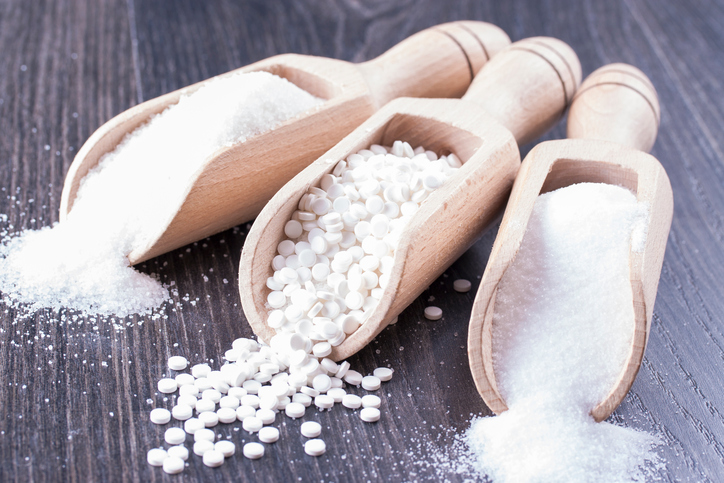
Research has shown that artificial sweeteners contribute to weight gain, neurological effects and more. Over the last several decades, we’ve learned a lot about sugar and how it negatively impacts our health. In order to help people reduce sugar consumption and lose weight, governments have approved artificial sweeteners in a misguided attempt to improve our health. We’ve tried to have our cake and eat it too, but the truth is that artificial sweeteners have had the exact opposite effect of what was originally intended. Instead of helping us, they have only caused us harm.
I’ve spoken many times before about the low-fat craze: we once thought fat was the enemy, and it turns out that all the low-fat advice we were given was totally wrong. I fear that 20 or 30 years from now, we’ll be in the same boat with artificial sweeteners and in the meantime for many people, the health effects will be devastating.
Artificial sweeteners are a big part of the low-fat doctrine because they are calorie-free. And even though the evidence overwhelming indicates that fat is beneficial and essential to health, people still have a difficult time giving up their artificial sweeteners. A recent study of 17,000 people reported that artificial sweetener consumption in children rose by a whopping 200% since 1999, with children as young as 2 years old consuming them weekly. In adults, artificial sweetener intake grew by 54% in the same time period.
This is a controversial topic among health professionals and consumers, and we know that I am no stranger to controversy. I feel very strongly about this issue and today I want to delve into it and explain some of the reasons why I don’t consume artificial sweeteners, and why I don’t believe they can be part of a healthy diet.
What Are Artificial Sweeteners?
Artificial sweeteners are synthetic chemicals designed to help us lose weight, reduce sugar consumption and manage blood sugar levels. They include:
- Aspartame (NutraSweet, Equal)
- Sucralose (Splenda)
- Acesulfame K (Sunette, Sweet One)
- Saccharin (Sweet ‘N Low, Sweet Twin)
- Sugar alcohols (Xylitol, Sorbitol, Mannitol, Isomalt)
The reason these sweeteners are intended for health purposes is because they are anywhere from 200 to 400 times sweeter than sugar, which means a very small amount is needed to add sweetness and they don’t have calories or affect blood sugar levels.
However, their safety is questionable, despite the fact that they are approved by governments. Consuming a small amount may seem harmless, but what if you put it in your coffee, chew gum, brush your teeth with conventional toothpaste, have a diet soda, or eat cookies, candies or cereals? What is the collective load of all that?
Dietary Sources of Artificial Sweetener
- Diet sodas and other low-calorie beverages
- Condiments (ketchup, salad dressing, etc.)
- Low-fat yogurt and other dairy
- Chewable vitamins
- Toothpaste
- Breads and crackers
- Cookies, cakes and other pastries
- Juice
- Cereal, granola and granola bars
- Most products that touted as low-fat, low-calorie and sugar-free
In a nutshell, artificial sweeteners are used in packaged, processed and convenience products and they don’t support our health.
How Do Artificial Sweeteners Impact Our Health?
Artificial sweeteners are not food. They are completely synthetic. Any ‘food-like’ substance or chemical that we put into our body that is not from nature increases the toxic load we carry. Any chemical that makes its home in the cells of our body and hangs out for a while has the potential to damage our DNA. When the DNA of our cells gets all kaleidoscoped and we continue to feed ourselves disease-building processed foods, we don’t have what we need to reverse the damage. If our daily activities – which include the food we eat, the way we handle stress, our activity levels, our digestion and sleep – don’t work in our favour to repair DNA, to improve the integrity of our cell membranes and the efficiency of our own elimination pathways (poop, skin, liver, kidneys, lungs) then we are working towards building disease.
Here are some more details about the ways artificial sweeteners impact our health.
weight gain + obesity
As I mentioned earlier, doctors and the public consider artificial sweeteners a calorie-free option and believe that including them in our foods will allow us to lose weight and prevent obesity. Unfortunately, the opposite has happened. A recent meta-analysis of 37 studies that followed over 400,000 people concluded that artificial sweeteners are actually linked to an increased risk of weight gain, obesity, Type 2 diabetes, hypertension and metabolic syndrome.
And that meta-analysis wasn’t the first to draw this conclusion. An 8-year study in the 1980s of more than 3,000 people in San Antonio, Texas discovered that drinking 2 or more drinks sweetened with artificial sweeteners doubled the risk of obesity and being overweight when compared to those who didn’t drink any. Another year-long study of 78,694 women found that those who consumed artificial sweeteners were more likely to gain weight than those who didn’t have them at all.
It’s a similar story with children: a study of more than 10,000 adolescent boys and girls in the late 1990s concluded that the kids who drank more artificially-sweetened beverages were more likely to have gained weight and have a higher BMI.
So if these artificial sweeteners have no calories, why do they make us gain weight? It isn’t about what’s on the nutrition panel – it’s what’s actually in a food that matters. Our brains get faked out by chemical sweeteners, which are sweet on the tongue but don’t provide the same level of reward that non-chemical sweeteners do, such as sucrose and glucose.
As the researcher in this study says: “Sweetness decoupled from caloric content offers partial, but not complete, activation of the food reward pathways. Activation of the hedonic component may contribute to increased appetite. Lack of complete satisfaction, likely because of the failure to activate the postingestive component, further fuels the food seeking behavior.”
Essentially, what this means is when we have a sweet taste, our brains and bodies expect the calories to come. When they don’t, we keep looking for them. With artificial sweeteners, we may momentarily satisfy a sweet craving without spiking our blood sugar, but as a result of this fake out, we may find another craving not too long later as our body was all geared up for a little calorie action from actual food. Artificial sweeteners, therefore, can cause the soda-pop sippers to either keep sipping or keep snacking, both of which are vicious cycles.
cancer + tumors
There is a body of research, mostly conducted on animals, that indicate artificial sweeteners are linked to tumor growth and cancer development. Some of this research includes:
- Researchers of this study linked the rise in brain tumor rates to an increased consumption of artificial sweeteners.
- Aspartame induced lung and liver cancer in mice, particularly in the males.
- Aspartame fed to rats caused an increase in tumors and lymphoma-leukemias.
- This 2007 study asked the FDA to reconsider its position on artificial sweeteners based on the risks found in animal models.
- This study of mice concluded that aspartame impacts the tumor suppressor genes that protect cells from cancer.
- This study of human cells showed that aspartame slows down the destruction of cancer cells.
- A study of human patients linked artificial sweetener consumption for 10 years or more with urinary tract tumors.
Studies in animal models may not mean that the exact same results will happen to us, but they do point to a very real risk and it’s enough that some scientists and organizations have raised the alarm about the potential cancer risks in humans.
The Gut Microbiome
The bacteria in our digestive tract is essential to our health. A healthy balance of gut flora not only impacts the obvious – digestion – but also our immunity (70% of our immune system is located in the gut) and our mood (our digestive tract makes 95% of our serotonin, one of the brain’s feel-good chemicals).
Evidence points to the fact that artificial sweeteners may alter the gut microbiota and be the cause of some digestive distress and symptoms. A fecal study of animals showed that aspartame consumption led to an increase in bacteria, including the Enterobacteriaceae, a family of bacteria that can include e.coli and salmonella.
Diabetes + Blood Sugar
Proponents of artificial sweeteners claim that they are perfect for diabetics because they don’t impact blood sugar levels. But just like the weight loss claim, this is another ‘benefit’ that has proven false.
In one study of 61,440 women, researchers analyzed artificial sweetener packet consumption over a course of nearly 20 years. They found that artificial sweeteners actually increased the risk of Type 2 diabetes. In another piece of research that examined 6,000 middle-aged adults, scientists discovered that artificially-sweetened soft drinks boosted the risk of metabolic syndrome, a collection of factors that includes high blood sugar levels, obesity, high blood pressure and high cholesterol. These findings are echoed in another study of close to 7,000 adults, which associated a daily soft drink with a higher risk of Type 2 diabetes and metabolic syndrome.
Other evidence points to the microbiome and that disrupting the microbiome can lead to metabolic issues like impaired glucose tolerance.
dental care
Artificial sweeteners are used in conventional and natural toothpastes to make them taste better without causing damage to our teeth. One could make the argument that xylitol, a sugar alcohol often found in toothpaste and chewing gum, isn’t carcinogenic and can help prevent cavities (though xylitol can cause diarrhea in large amounts, and don’t give it to your dog because it’s toxic to them).
However, this study of several different types of sweeteners found that while the artificial versions were less likely to cause cavities than sucrose, they still had the potential to demineralize enamel and disrupt the metabolism of bacteria.
And, as this study points out: “By far the biggest use of sugar substitutes is made without concern for teeth or gums.” Most artificial sweeteners are used in diet drinks and other low-fat, low-calorie treats, which may contain other ingredients that damage our teeth such as citric or phosphoric acids.
Also, dental health isn’t just about what comes directly in contact with our teeth or what we use to brush them. Holistic dental care is about our entire diet and lifestyle practices that serve to promote oral health and protect our teeth. Artificially-sweetened key lime pie yogurt just isn’t a food that I would consider an important part of the dental health picture.
Other health risks
There is an extensive array of ways that artificial sweeteners may impact our health. Investigations show they can also:
- Cause neurotoxicity and neurological symptoms
- Lead to kidney decline
- Trigger migraines
- Cause DNA damage
- May accelerate aging
- Damage the liver
- Affect our ability to learn and emotional function
What Benefits Do Artificial Sweeteners Offer Us?
This is the continual question I have about them. Governments classify them as safe for us to consume. And even if you can argue that artificial sweeteners may not harm us, what do they actually give us? I don’t need to see proof that something man-made in a lab won’t kill me for me to eat it. I want proof that something man-made will heal.
I have never seen a study that proves artificial sweeteners to be healthy, health building or health supportive. The cells of our body are made by what we eat. Artificial sweeteners are a chemical and are therefore an extra burden to be processed through the liver that will result in chemical byproducts, and therefore produce high amounts of free radicals. Low and behold, we have increased the toxic load on the body.
No one has to do a study to tell me that broccoli won’t cause blindness in one or both eyes, that carrots won’t lead to tinnitus, that honey won’t cause severe slurring of speech, and that maple syrup won’t cause irreversible brain damage. Any food that we eat doesn’t just need to set the low bar of not killing us – it needs to offer us the micro and macronutrients we need to build our health. I believe strongly that intake, in any amount, of artificial sweeteners isn’t part of the solution to any health issue.
Are We Addressing the Root Cause?
Companies don’t add artificial sweeteners to fresh carrots, berries or dried beans and legumes. They are adding it to processed foods, mainly sweet drinks, snacks and desserts, to help us lose weight or manage diabetes.
However, aren’t we bypassing the real issue here? If someone is overweight or has blood sugar issues, shouldn’t we be reducing our total sugar consumption? What about focusing on whole food diets that are rich in protein, fat and fibre, which will boost satiety and help us manage blood sugar? What about exercise?
Trying to solve someone’s addiction to chocolate cake by giving them artificially-sweetened chocolate cake doesn’t get to the root of the problem.
Alternatives to Artificial Sweeteners
There are so many whole food options that we can use instead of artificial sweeteners.
If sugar isn’t an issue for you, I’d recommend small amounts of the following:
- Raw Honey: This superfood is packed with enzymes, amino acids and antioxidants. It’s also great for your natural first aid kit!
- Maple Syrup: A Canadian staple, maple syrup is rich in antioxidants and minerals like zinc, calcium and manganese.
- Coconut Sugar/Syrup: These are tapped from the coconut palm tree and are low on the glycemic index.
- Molasses: Molasses is a by-product of refining cane sugar, but unlike processed sugar, it is full of nutrients such as iron, magnesium and potassium.
- Apple sauce: The pectin in apples helps with binding in gluten-free baking, plus they are rich in antioxidants and fibre.
- Dates/Dried Fruit: Make date paste by soaking dates in water and then blending them up. You can do this with a variety of dried fruits and change the consistency of the paste to be how you like it. Or you can eat a small amount of dried fruits as a snack.
- Bananas: Mashed bananas are fantastic in baked goods and add extra fibre and potassium.
- Sweet veggies, like carrots, beets and bell peppers: These will give you a sweet taste and provide you with antioxidants and compounds that support the liver.
- Fresh fruit of all kinds: A fresh apple is very sweet! But when we eat a lot of sugar, we get de-sensitized to the natural sweetness of fruit. Fruit offers us sweetness, but also a range of vitamins, minerals and fibre. Aim for low-glycemic fruits if blood sugar is an issue.
If there is an issue with blood sugar in cases of Type I or Type II Diabetes, give the following a try in moderate amounts:
- Stevia: This plant is actually much, much sweeter than sugar, so you only need to use a small amount of it. Aim to purchase green powdered stevia, as that is the plant that’s been dried and ground. Clear stevia extract has gone through much more processing and is further removed from the whole food.
- Xylitol: This sweetener is from the family of sugar alcohols, which are growing in popularity. Xylitol is naturally found in fruits and vegetables, but it’s often extracted from birch wood. It can help with dental caries and balancing blood sugar. In large amounts, it can cause bloating and diarrhea – and it’s toxic for your pooches.
- Monk Fruit: This is a very low-glycemic option that is made from monk fruit. In the powdered form, it’s 150 times sweeter than sugar so you certainly don’t need to use a lot of it.
- Erythritol: This is another sugar alcohol and like xylitol, erythritol can help prevent cavities and balance blood sugar. Don’t consume too much, as it can also cause digestive upset. Most erythritol is derived from corn, so ensure you use a brand that is non-GMO.
Or can you go sugar-free entirely? Get on the waitlist for our next group 7-Day No-Sugar Challenge.
And if you’re not ready to give up sugar, please consider dropping artificial sweeteners from your life. You have nothing to lose and only better health to gain.
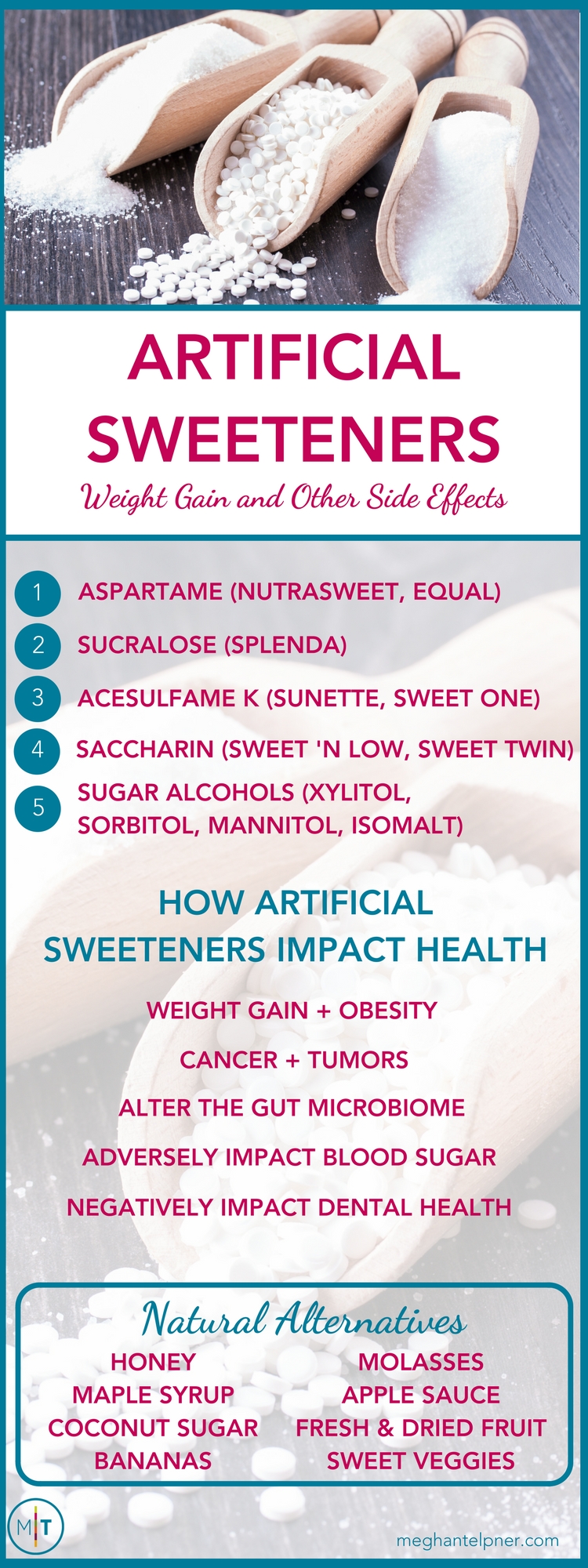
Image: MamaMiaPL
Free Resource Library
Enjoy more than 40 downloadable guides, recipes, and resources.

















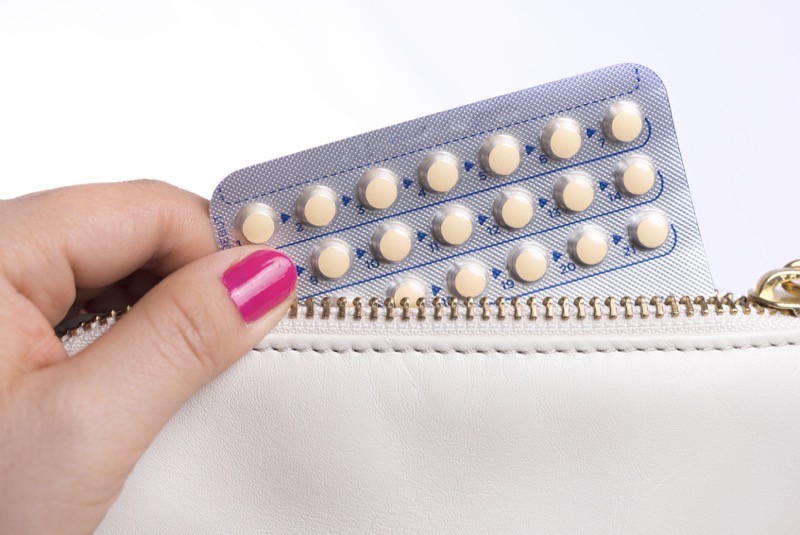
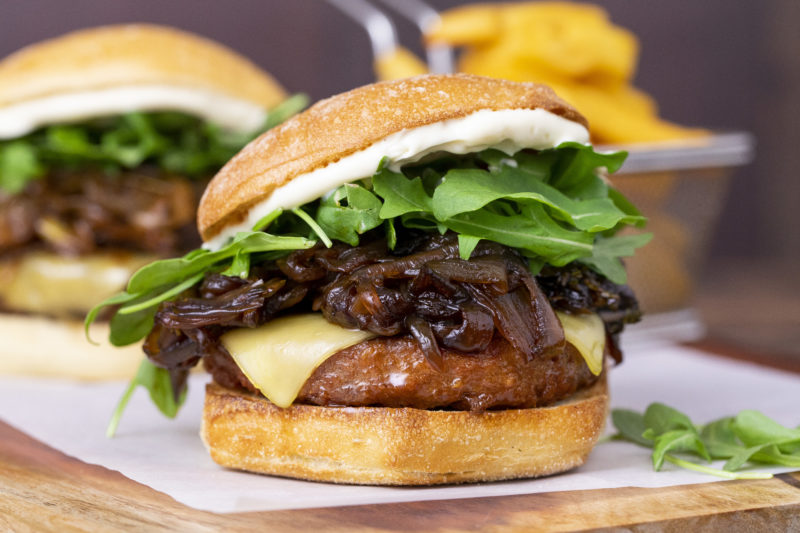
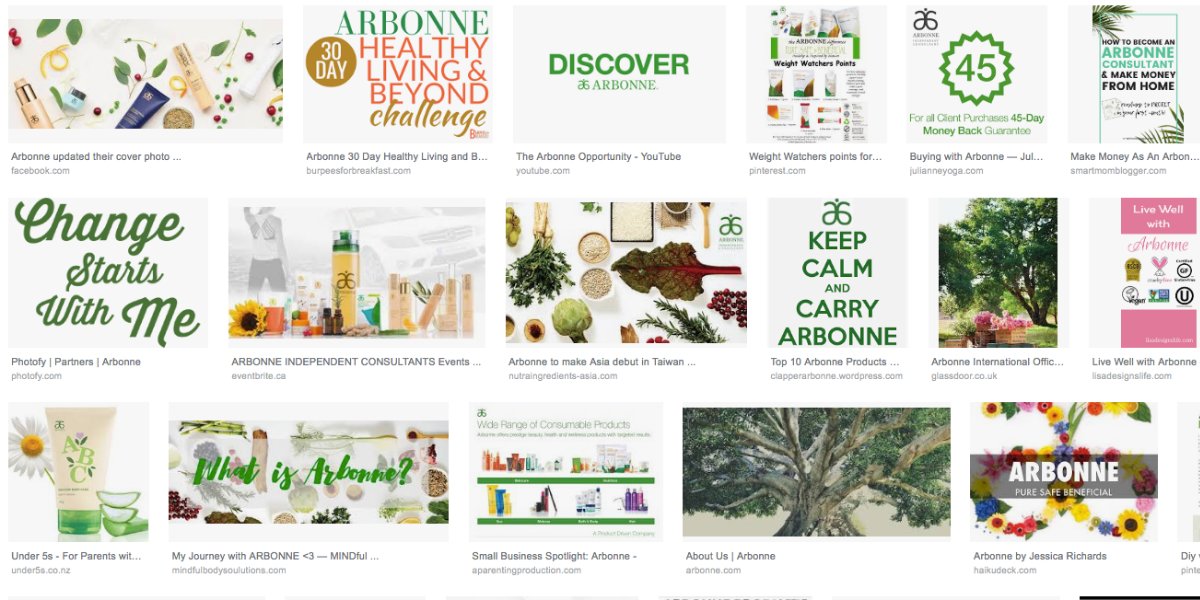
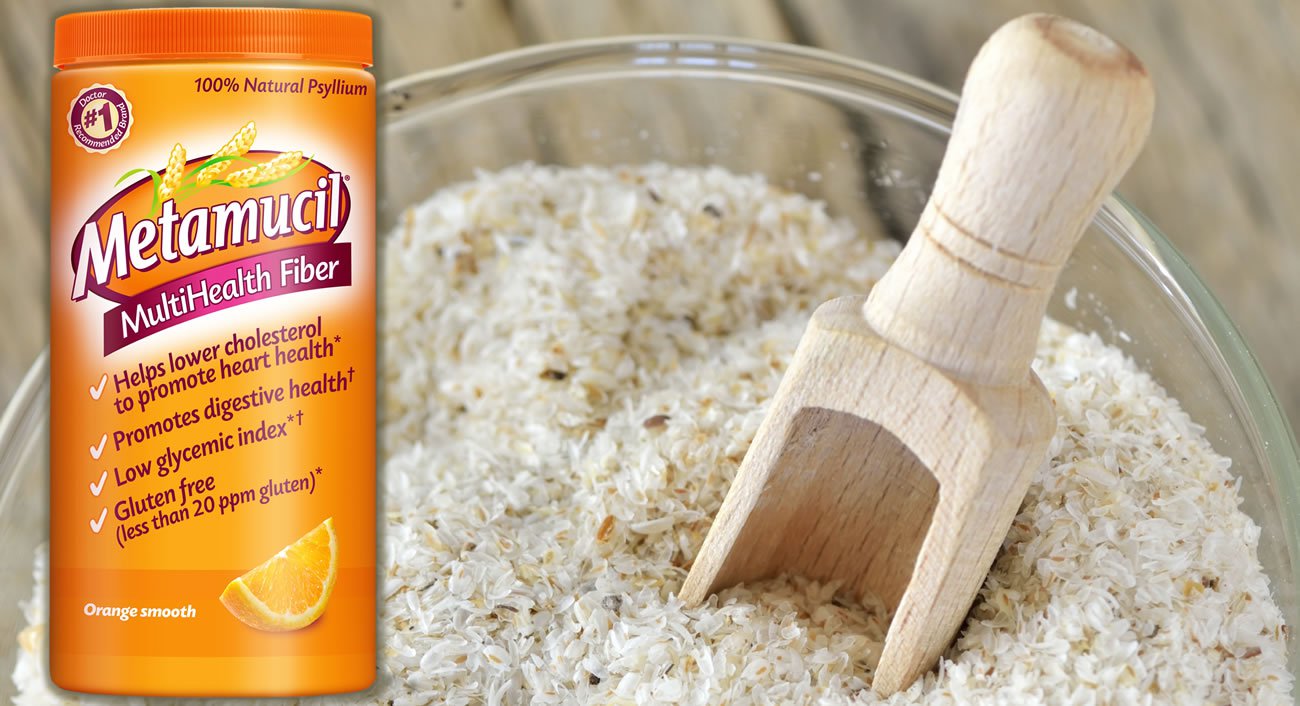
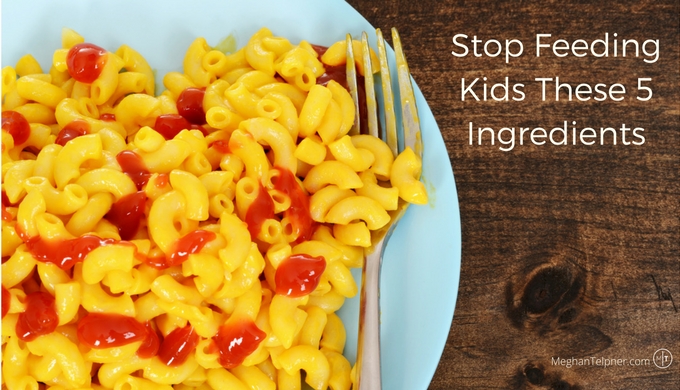


Unscientific, naive, misinformation. What can I say? So many errors as to be on the silly side of life.
Here here! As always Meghan, your are so articulate and clear. Thank you for taking on such a controversial topic and FINALLY spreading some truth that many would prefer you not say.
Bravo! Loved this series of posts.
It’s funny, the more educated and scientific people get, the more they lack any semblance of common sense.
The human body is meant to consume what nature provides, not the man-made chemicals designed in a laboratory for profit.
It’s VERY telling that when ‘experts’ comment about how ‘wrong’ you are, they don’t include ANY information detailing why, Meghan. It’s not enough to say ‘you’re talking crap, nah nah nah nah nah’ and expect that people will say ‘Oh you’re SO right! Aspartame must really be GOOD for me!’
Surely there can’t be any argument that an artificially made sweetener is not something that we were biologically made to process? Even a little kid could assume that. Does anyone ever feel good, healthy and well after drinking a Diet Coke? Even if you don’t get a headache or other major symptoms, you might feel a little funny in your tummy when the chemical cocktail inside gets to work on your poor intestines. It’s not rocket science really is it?
And I say this as someone who, during a period of calorie counting (thankfully replaced eventually with nutrition embracing!) used to turn to a diet drink as a food replacement when I wanted something sweet…I never drank more than a few a week but I can totally see how it becomes a crutch when people are watching their weight or want to “eat without eating”….rather than figure out what our body needs (and I’m still on a journey with that myself) we turn to chemical-laden artifical products targeted with us in mind: no fat! no sugar! synthetic taste! And then we congratulate ourselves on skipping a few calories. It’s a pretty sad and hard cycle to break, and these companies don’t want us to break it because it keeps them in business.
(sorry that was a bit of a rant!!)
My Dr. told me years ago that being a diabetic I had to stay away from all fake sugars because it would do so much harm to organs and to the stress of my body. When our body tastes the sweet on our tongue it reacts the same way as if it were real sugar (our bodies are smart like that) and all the same things in our body start to happen – insulin gets released because it senses the sugar coming. Except the sugar never comes, it needs something to attach to and so we crave sugar and other foods because the insulin is just left hanging there with nothing to do. I was thankful for an informed dr. who told me what I needed to hear, and who wasn’t afraid to tell the truth.
Great post – if anyone doubts the effects – just go off of it.. and see what happens. If you can’t – you can know that you are addicted, something that does not happen in healthy whole foods.
I never trusted the whole sucralose thing – if something is too good to be true, then it probably is.
I’m very strongly opposed to artificial sweeteners as well; I’ll have to link back to your posts frequently when others ask me why! What a clear, succinct, and comprehensive argument.
Whenever I see someone arguing with this type of common sense, insightful information about healthy living, I think: Hmmm, are they part of the traditional medical establishment or the pharmaceutical industry? there are some wonderful people in the medical field, but others who are just so afraid of what they do not know. I feel sorry for you Dr. March.
I gave up artificial sweeteners a long time ago and will never go back. The hardest habit to kick was gum chewing. Now I chew on fennel and caraway seeds.
Thanks for posting this information!
Meghan, Thank you so much for this explanation. When I was a teenager I had a summer job on a team of proofreaders. One person would read aloud while a partner would follow along looking for discrepancies. Every morning things went well, but we all had a deadly habit of drinking a diet coke at morning break and another couple at lunch. A couple of us (perhaps not a coincidence we were the slimmest?) were slurring our speech after lunch every day!!! It actually made it hard to do our job.
I finally made a connection to the artificial sweetener and kicked the habit, and regained my ability to speak clearly and think straight. My friend kept drinking and slurring.
I’ve raised my boys to believe that all soda is poison but especially the diet stuff. I know one of them has one occasionally but this might reform him.
You’re so smart and only silly in the best sense. xo
I’m grazing on the green side of the pastures ;-) *(you get me)
Meg,
I was wondering what evidence you have that corroborates your claim that, “It may not be a direct cause of cancer, but it is without a doubt a contributing factor.”
As I am sure you are well aware, Health Canada states otherwise. “Scientists in the world-wide scientific community, including Canadian scientists, have found no link between aspartame consumption and the incidence of cancer or brain tumours from a study of the safety studies performed with aspartame.”
Is Health Canada wrong to make this claim? Thanks.
Meghan I’m so glad you are going over this. My mother-in-law uses a ton of equal in her tea. She uses about 3 paks per mug.
Any food that is “artificial” can’t be good for you.
It has been noted with aspartame that one of its side-effects is *weight gain*. This has been explained, at least in part, by what’s called the *cephalic response*, where the brain tastes ‘sweet’ and responds with insulin, just as if there was sugar coming in. The brain has not yet adapted to sweet flavors other than those that raise blood sugar, so it responds to sweeteners–maybe all sweeteners–with insulin. I haven’t yet seen any research on stevia, but it wouldn’t surprise me if it, like aspartame, elicited the same type of response.
Look up this ‘sweet’ article for more info.:
Powley, T.L. and Berthoud, H.R., Diet and Cephalic Phase Insulin Responses. Nov 1985 Am. J. Clinical Nutrition; 42: 991 – 1002.
**Oh, & Aspartame may also cause weight gain because, unlike sugar, it doesn’t elicit a release of serotonin, which helps signal satisfaction.**
I love when people post amazing references and links.
Meg – since you like references and links so much, here are a couple more for you:
American Cancer Society –
“Aspartame has been approved for use as a sweetener by the FDA and by the Joint Expert Committee on Food Additives of the United Nations Food and Agricultural Organization, and the World Health Organization. They have concluded that aspartame does not cause cancer or other adverse health effects in the general population. Though research into a possible link between aspartame and cancer continues, no study to date has had results that change this conclusion.”
National Cancer Institute –
A study of about half a million people, published in 2006, compared people who drank aspartame-containing beverages with those who did not. Results of the study showed that increasing levels of consumption were not associated with any risk of lymphomas, leukemias, or brain cancers in men or women.
I must admit I am somewhat concerned….are these studies flawed? Is there something these institutions are hiding from us? Thanks.
As an avid reader of your blog I am always excited to find great recipes, health advice and just overall good vibes from you. I appreciate that you interact with your readers via your comments board and that we are allowed to ask questions, comment and build an online relationship with you. No question to silly right?
I have noticed lately however, particular when it comes to the topic of artificial sweeteners you seem to be quite on the defense whenever anyone questions your opinion or asks you your thoughts on specific research or articles they have found. I understand some people may send rude comments, but don’t you think it is better to leave them unpublished then to backlash at them on your comment board. As a fan and someone who looks up to you I feel as if I should point out that it makes you look as though you have stopped to their level by responding aggressively.
A reader once asked you your opinion and thoughts on some articles he had found regarding artificial sweeteners and instead of giving him your opinion you asked ” why do you care what I think?” or “why do you want my opinion?” Consider this Meghan, if we did not care what you thought we would not be following your blog or taking the extra time to ask YOUR specific opinion on things.
You portray such a positive image and healthy lifestyle and thats why your readers look up to you. Maybe it would be best to “kill them with kindness” and keep up with the image that you work so hard to maintain.
Sarah B
I thank you for your comments Meghan and could not have said it much better. Dr. Peter March is the one who is on the ‘silly side of life’ indeed.
Nicely done. I especially like this:
“Let’s put that little combo together. We have impaired, weakened or depleted immune function, damaged DNA, and throw in a little time and stress and chances are good that we’ll be building the big C in our bod”
This is something I think that more people can believe, more so than the direct cancer link.
Of course, people either subscribe to this ideology or they don’t. They either believe you or they don’t. If they’re reading your blog it’s likely that they’re already like-minded.
(I’d make a reference to “drinking the Kool Aid” but here it seems ironic. :) )
It’s hard to get non believers on board. Some people need numerous scientific studies. I’d like Dr. March to provide constructive criticism rather than name-calling. What you often provide is logical. Science is fallible, based on variables, subject to funding. Often I prefer anecdotal evidence over science and feel smug when scientific studies confirm what I already knew.
Sadly, Dr. March’s credentials do make him more valid in a sense. Doesn’t mean he’s right, a doctor’s credentials make them an “expert” and that’s kind of scary sometimes. I agree wholeheartedly about some doctors perpetuating that stereotype while others are “amazing, inspiring and progressive”.
[I know this is a lengthy reply. I actually edited it down.]
Thanks for your sharing your knowledge Meghan. The most difficult thing I find is people’s comments when I say no to sugar – “Please don’t tell me you’re watching your weight”, reffering to my small frame. And when I reply that in fact I’m looking out for my health they role their eyes. I’ve stopped trying to convince people about the evil of sugar. My family have a lot of soft drink and I always have water with my meals.
I have also noticed that my anxiety is much better managed when I cut down on my sugar intake. I was always being told by my hypnotherapist not to eat lollies and chocolate when I’m stressed as it makes things worse. I think it’s extremely interesting the level of impact food has on us, not just on our physical well-being but on our mental well-being as well. Parents whose children have autism or ADHD often report positive changes when their diets have changed. It’s actually a bit scary just how bad the general population eats.
My feeling is that studies look at things very narrowly. Until these chemicals are proven healthy, they have no role in my life. Why should a completely unnecessary and controversial substance be used so widely?
This is the challenge with simply reading the reports at face value. You can always always always find a study that supports the point you want to make. I always encourage people to make independent decisions. If someone believes these substances are harmless for them, or perhaps even beneficial, that decision has nothing to do with my sharing how I feel and how I choose to live. It really is all about the choices me make. I just like to keep it simple.
Unless comments are openly rude and unrelated to what the topic of the post is, I leave them there and usually comment by asking questions in return. And the reader you are referring to was the same person each time. Jordan is my brother;s best friend and our first cousin :)
I personally admire that you DO publish such comments. And that you answer them. It shows that you are not editing comments in your favour, and that you do have answers or further questions for anyone who disagrees.
There are several texts that discuss the link to cancer which I have broken down in my post discussing the change in DNA combined with compromised immune function. My emphasis on this blog and in my work with clients is always to promote healthy lifestyle practices.
Here is the reason, explained by another writer as to why I don’t have specific URLs I can provide that site studies to support the nature in which toxins, including those of artificial sweeteners, push us towards cancer:
“With all of the cancer information and disinformation broadcasted continually through the major news media, rarely do we hear a mention of the greatest threat to our health – and the most prevalent cause of cancer: toxins. Toxins (poisons) are ubiquitous in our modern world. Although those cancer researchers and foundations making the news headlines, mostly funded by pharmaceutical corporations and chemical manufacturers, seem to be obsessed with finding a cancer virus or genetic predispositions to the disease, as a society we are not being given the whole truth that toxins cause most cancers.
Independent researchers (e.g., read Cancer-Gate: How to Win the Losing Cancer War, by Samuel Epstein, MD) understand that toxins cause disruptions in cellular function, cellular differentiation, cellular protection, and immune system function. Such poisons also place great stress on the eliminatory system that tries, often in vain, to rid our bodies of a toxic overload; this includes the kidneys, liver, cardiovascular system, lungs, bowels and skin. Toxins are known to rob our bodies of oxygen and cause free radical damage to cellular structures; they also are cumulative, leading to illness and symptoms now and into the future. With all of the cancer information and disinformation broadcasted continually through the major news media, rarely do we hear a mention of the greatest threat to our health – and the most prevalent cause of cancer: toxins…. Thanks to the power and greed of industry, the public is kept in the dark about many of the causes of cancer. Instead we are fed news reports about genetic connections, viruses and early screenings. Biologically speaking, as human beings, our bodies are not equipped to handle the onslaught (or combinations) of toxic overload that exists in our modern world. Until we realize that synthetic chemicals are causing most cancers, we cannot begin to stem the tide of disease and suffering. ” (Continue reading here: http://www.nutritionalwellness.com/archives/2006/mar/03_toxins.php
“A statistically significant increase in the incidence of malignant tumors, lymphomas and leukemias in rats exposed to varying doses of aspartame appears to link the artificial sweetener to a high carcinogenicity rate, according to a study accepted for publication by the peer-reviewed journal Environmental Health Perspectives (EHP).” http://www.sciencedaily.com/releases/2006/02/060213093019.htm
This link, lists many reputable professionals questioning the FDA’s results in the study you mentioned: http://www.naturalnews.com/011804_aspartame_tumors_brain_tumor.html
I strongly recommend you read this one as well: http://www.opednews.com/articles/FDA-HID-RESEARCH-THAT-DAMN-by-Dr-Betty-Martini-091103-94.html
These reports put us, as consumers, in the challenging role of having to question whether the boards that govern our health and safety are in fact looking out for our best interested and can be trusted.
As I said as well, we can always find studies to support an argument as well as disprove others. In response to whether I think Health Canada/DFA are wrong. No, not in the context in which they have presented this information. I don’t think they are wrong, but I do think they take a very narrow look.
The challenge is that scientific studies often have to take a black and white approach to thing. If for example, it has been proven (which it has) that artificial sweetener can lead to weight gain, and carrying of excess weight leads to an increased risk of cancer, doesn’t that than make it a contributing factor? The thing about these artificial sweeteners, in moderation as part of a generally healthy diet and lifestyle, they could be completely harmless with the assumption that the liver, kidney and bowels are working as efficiently as they should be. There are thousands of variables that would be impossible to address in a clinical study- especially one where it is in the best interests of parties involved to have the results go in their favour. That is the politics of the industrialized food industry and getting into that opens a whole other ginormous can of worms.
I digress, as one of my readers said, however, it tends not to be the really healthy people with clean diets that are drinking a couple diet cokes a day.
The thing about holistic health care is that we don’t look at a single study and say that x doesn’t lead to y in z part of the body, so it must be fine. The whole mindbody is address as a single entity, a network of interrelated systems and energies. This is where the challenge comes in when we try and merge scientific studies with real human beings in natural settings, living regular lives. If you are seriously interested in reading further into this, beyond what is stated in government and/or industry funded scientific studies I strongly recommend reading some of the following. These books take a completely different view of the body than is taught and shared in conventional medicine.
Sweet Deception: Why Splenda, NutraSweet, and the FDA May Be Hazardous to Your Health by Dr. Joseph Mercola and Dr. Kendra Degen Pearsall
Eat Safe: The Truth about Additives from Aspartame to Xanthan Gum by Bill Statham
Foods to Fight Cancer: Essential foods to help prevent cancer by Richard Beliveau
How to Prevent and Treat Cancer with Natural Medicine by Michael Murray
The Secret History of the War on Cancer by Devra Davis
Aspartame Disease: An Ignored Epidemic by H. J. Roberts
If I have still not answered your questions than you’ll have to move on. Ekhart Tolle has written that sometimes it is better to be at peace than to be right.
I would be happy to be proven wrong on this, but until cancer is eradicated while people continue to consume the volume of artificial sweeteners, other preservatives and carry the toxic load that we now bare, I suppose the debate could continue indefinitely.
Meghan:
It is difficult even to begin to explain how misled you are. First, aspartame is perhaps the most studied substance in history, whether you believe it or not. It is generally recognized as safe (GRAS) by every viable regulatory authority in the Western world. There are no viable scientific studies that suggest any adverse effect from aspartame. One by one they can be systematically eliminated from rationale consideration. You cite a study- “A statistically significant increase in the incidence of malignant tumors, lymphomas…” claiming otherwise. But all work from that Ramazzini lab, not just on aspartame, but on many other substances has been dismissed, because their rats were sick.
I discovered and reported at two national meetings in 2008 that all the original (Searle) work on aspartame was flawed by a design error that was also present in virtually all rat experiments including the Ramazzini work you cited. Cited FDA critics of Reagan, Rumsfeld and others alleging some sort of cover-up miss the point. All that early work was done incorrectly. It was redone with corn-soy rat diets rich in folate and the issue disappeared.
Below I explain more about this issue and why there is no issue. The fact is that methanol from aspartame is readily oxidized to formic acid (formate) and that is processed by the folate vitamin system. Folate reduces formate with the help of vitamin B12 to form methyl groups that are placed to protect tissue and DNA from damage. That methanol you seem to think is poisonous is actually not even toxic itself, but all its toxicity resides in its formate metabolite and it’s induced acidosis — stop the acidosis and the toxicity disappears and sufficient folic acid vitamin does just that.) That methanol is actually a vital substance for life, because without it there would be no formate for making methyl groups. Methyluracil (thymine) would not be formed and would not be incorporated into the DNA. Instead uracil would enter DNA and uracil makes the DNA fragile and break. Broken DNA is synonymous with cancer! Moreover, without the methylation and reduction of toxic homocysteine (perhaps the most powerful excitotoxin) to methionine (methylhomocystine), suffice it to say you simply wouldn’t live very long. The problem is that in this process some formate does destroy a very small amount of the folate that processes it. Vitamins by definition are required in small amounts and must be replenished daily irrespective of why they must be replenished. But over time, if not replaced that folate becomes deficient. All these early experiments fed aspartame to rats and nothing to control rats, but that is improper design because the methanol, just in the treated group will deplete the vitamin folic acid (folate). And folate deficiency is directly linked to lymphomas, leukemia, and other cancers. To do the work correctly you must feed methanol to the control group (difficult, because of its volatility) or one must provide supplemental vitamin to both groups. So not only did the Ramazzini group make their rats deficient in folic acid, but his rats were deficient in the first place (takes too much space to explain here) and their rats were a strain that becomes deficient as they age and at half the time of the Ramazzini experiment. So these and all Ramazzini rat experiments have been done incorrectly. Susceptibility to certain pathogens may stem directly from folate deficiency, so the M pulmonis infection of the Ramazzini rats probably occurred after the folate deficiency arose and that was likely even before the experiments began.
Second, let’s explore what you missed by relying just on the antiaspartame critic’s argument that is by far more important than aspartame. What new information is available to better explain any sensitivity to aspartame? Aspartame’s methanol is metabolized to vital formate by the folate vitamin system, just like the methanol from fruit juice or brandy. “… the 90 different documented symptoms” mentioned in the antiaspartame literature (and you cite above) are actually all symptoms not of aspartame, but of very personal issues including folate deficiency, folate enzyme problems and/or accrual of the very powerful excitotoxin homocysteine (that most often arises as a consequence of folate issues). And these folate/homocysteine issues are actually common and play a major role in human disease today.
Perhaps you should take one more course in nutrition. This time concentrate on folic acid, its metabolism and its deficiency links to cancer and to birth defects, including fetal alcohol syndrome in which ethanol acts as an antagonist to the folate system resulting in the accrual of toxic formate and insufficient methylation. If you do you will discover that folate deficiency, folate polymorphisms (that is genetic issues), and homocysteine explain all allegations against aspartame.
John E. Garst, Ph.D. (Medicinal Chemistry, Pharmacology, Toxicology, and Nutrition)
(FYI, the author has absolutely no financial or biasing connection with the aspartame, the soft drink or their related industries. The author has a Ph.D. in Medicinal Chemistry (Pharmacy) from the University of Iowa, postdoctoral experience at Yale University (Molecular Biophysics & Biochemistry) and at Vanderbilt University and taught nutritional toxicology at the University of Illinois (Champaign-Urbana) besides having conducted federally funded research at Vanderbilt, UIUC, and at several other universities before recently entering into retirement.
Thank you for your thorough explanation. I suppose given the back grounds we each come from- personally, professionally and educationally, we will have to agree to disagree. I still prefer to keep foods out of my life and the lives of my clients I work with that had to be “the most studied substance in history”. That in and of itself is suspect. Additionally- someone consuming aspartame containing foods will be doing so in place of foods with naturally occurring vitamins and minerals including folic acid/folate.
I am grateful that there are professionals like you around to offer an educated perspective on the other side of the matter, and who would clearly be able to offer people taking pharamceuticals an explanation of how the drugs work in their body. My colleagues and I are here simply to offer an alternative lifestyle that helps reduce risk and prevent illness.
Meghan, thank you for your valuable contributions to the aspartame debate. While all the learned people rush to defend their studies, it seems as if common sense is put aside. Common sense says that adding chemicals to the body puts a burden on it over and above any naturally occurring burdens from normal digestion.
As someone who was misdiagnosed with IBS, but who in reality was drinking far too much aspartame-laden sodas, I can say with assurance that aspartame is not benign. Scientists will be quick to say, “That is just your unique metabolism” or what have you. The truth remains the same: we don’t NEED aspartame to live. We need whole foods, real foods and pure water in our systems to fuel our bodies. Anything else either displaces whole foods, as you have said, or bogs down the system.
Keep going. Don’t let the slings and arrows of PhD’s and people who want their diet colas get you down :)
The information that you have given to us is very valuable. I hope that the general public would understand and be aware of the ill effects of artificial sweeteners. They may cut off our calorie intake but they will also give us another harmful effects worse than those with calories. As a nutrition educator myself, I advocate on giving awareness campaigns on these “sweet poison” and how it can deteriorate our lifetime health status. Aspartame may be a good alternative but its wide use must never be tolerated. Many modern diseases are associate with aspartame
Thank you,Meghan Telpner. You are a HELPER. Just like…….. Dr.Don Colbert. Keep up the GREAT WORK. Many people out here love you.
Meghan, I rarely eat yogurt.. Once in a rare while I pick up one at my office cafe when I’m in a snacking mood. The other day, I read the ingredients. sucralose??? Who’d have thought yogurt has sucralose?? I haven’t bought one sicne then.
If at all I’m eating yogurt, I’ll stick to organic, very few and all natural ingredients or homemade yogurt. No more sucralose crap for me.
Awesome article. Well researched. Well written. And promotes wellness. Thank you!
I love healthy food but i wouldnt consider myself the healthiest person necessarily. Lets just say I come from a long line of women stashing chocolate in the freezer… A good dessert is my weakness and I’m working on it BUT my whole life I have always questioned this idea of fake or tampered with food. To me, I don’t need to read a study about how low-fat or artificial sweeteners or colors are bad for me. I feel like its common sense that something in it’s most original, natural form would be the healthiest version! I’m no health expert or scientist but this idea has always set well with me and guided my choices.
As for the aspartame comment, I know many people who get headaches from aspartame and I wonder why that is.
Thank you for this information!!What do you think about the substitute Truvia?
What a wealth of great, easy to understand information!! Thank you very much.
I am addicted to sweetners (canderel, equal, etc). I am now very concerned that your article mentions that one can actually GAIN weight from using sweetners. Sugar also contributes to weight gain so what suggestions do you have for sweetening my every day fix of coffee? I have an extremely sweet tooth hence thinking sweetners were a great substitute?
“green powdered Stevia” ?? Does anyone know where to purchase this and which brand? I have never seen a Stevia powder product which wasn’t white.
All Stevia sweeteners sold here (GTA) are adulterated with another sweetener or bulking agent. I have settled on SweetLeaf brand because it claims to be cut only with Inulin. I would stay away from Truvia as it is a CocaCola brand which usues more Dextrose & Erythriol than Stevia and, while PureVia was developed by Merisant & Pepsi with a similar mix and also using heavily proccessed “Reb A” extract and the cryptic “Natural Flavors”. “Whole Earth” is a sub-brand of the company which now owns PureVia.